Microsoft Search Champs and the Gift Basket, January 2006
I fly to Seattle for Microsoft Search Champs and to meet up again with my blog buddies. But there's a problem: no gift basket! Later I meet Erik Benson at the office of his startup, The Robot Co-op.
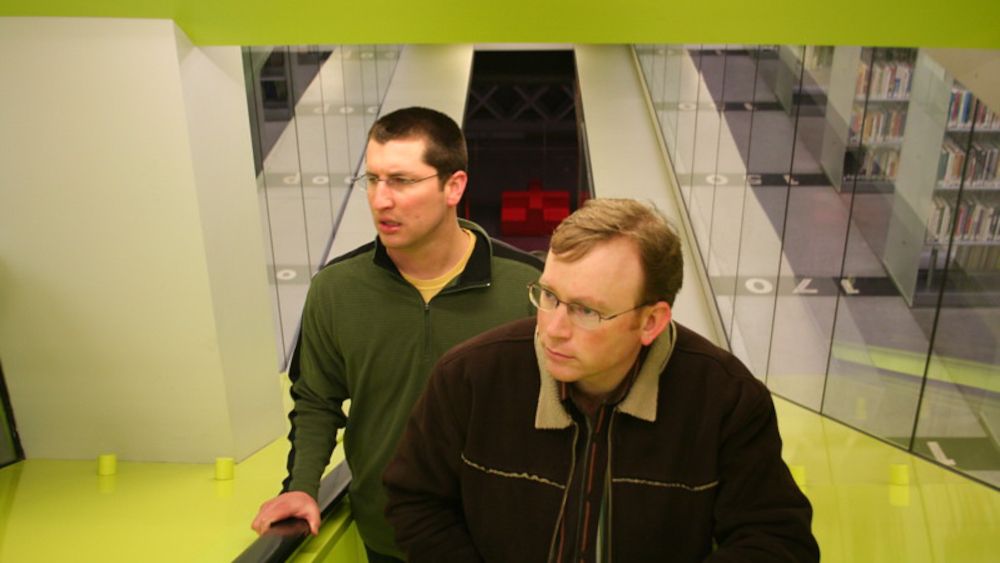
In the second week of January 2006, I got married to my partner of nine years, Maria. We had a 4-year old daughter, Rosabelle, who was one of the flower girls at the ceremony. The following week, I was on a plane to the United States again — but not on my honeymoon. I’d been offered a place in Microsoft Search Champs, an invitation-only event to be held at Microsoft’s headquarters in Redmond. Microsoft was paying for my travel and accommodation, so it was too good an opportunity to pass up. What web geek wouldn’t want to visit the setting of Microserfs, Douglas Coupland’s famous 1990s novel about Microsoft developers?
It’d also be my first trip to the grunge city of Seattle. Kurt Cobain had died there a decade ago, and I was kind of obsessed with him. One of the first nonfiction stories I’d written, during a writing course I took when I moved up to Auckland in 1994, was an homage to Cobain just after he’d killed himself. Later, I became interested in the conspiracy theories over Cobain’s death being peddled by the likes of Tom Grant, the private investigator who had been hired by Courtenay Love and later turned on her. Part of the cultural fascination for me was the role the internet played in the after-story of Cobain. Tom Grant had made himself into a pseudo-celebrity based on his theories, which wouldn’t have been possible if not for the web.
Search Champs was being hosted by the MSN Search group, which had invited over 50 bloggers, academics and technologists. Microsoft had selected the group “based on who we are reading and we think would provide us great insight.” I’d been recommended by Alex Barnett, a British expat about my age who worked for Microsoft in Redmond, and who I’d gotten to know virtually as part of the tech blogger fraternity. Mike Arrington, Fred Oliviera and Josh Porter had all been invited too, so I was looking forward to catching up with them.
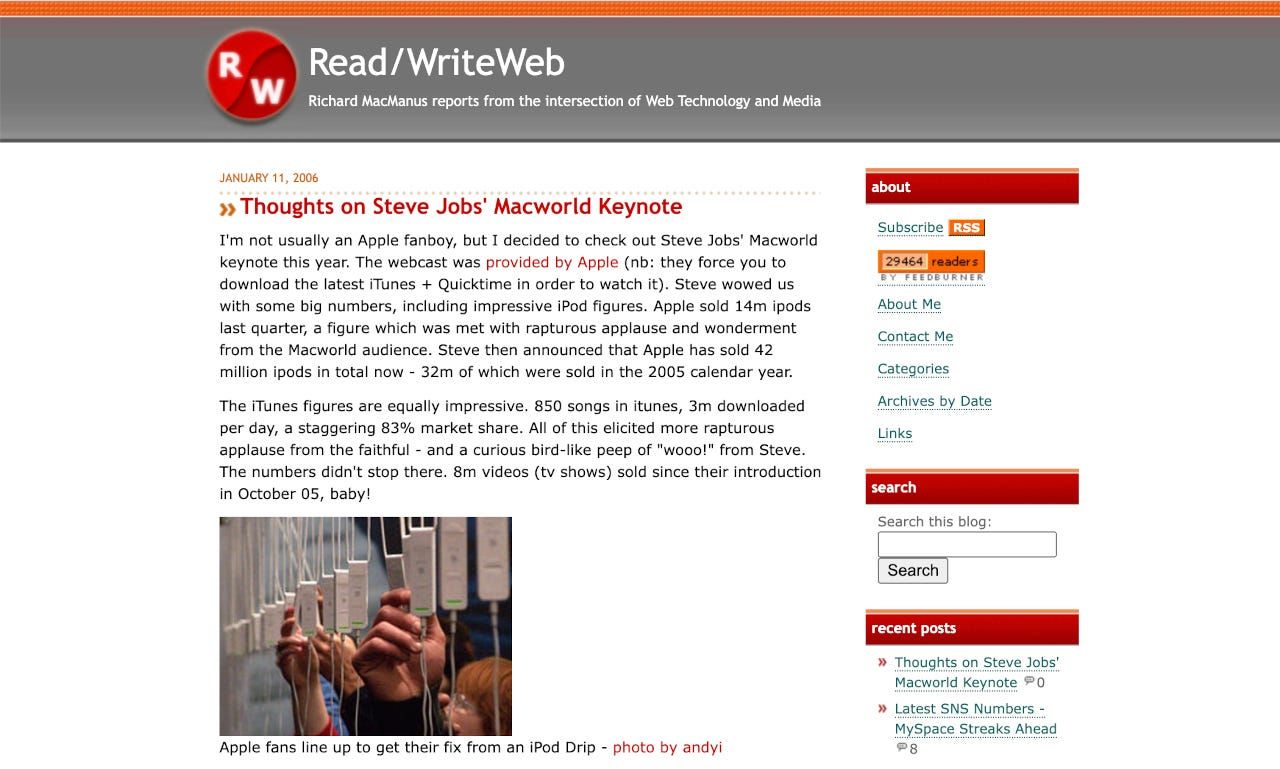
The event would be kicked off on Tuesday evening, with a reception at the Chapel Bar in downtown Seattle, near the W Hotel where we were all staying. I arrived in Seattle late on Monday evening, after a long series of flights from New Zealand. Fred had arrived earlier in the day and had emailed to let me know.
After showering, it was now well after 10pm and I was exhausted, so I gave up on any thoughts of going out and meeting up with Fred. I looked over the email messages for the Search Champs and saw a welcome message from Brady Forrest, the organizer of the event. He’d listed the basic schedule and other FAQs and finished with this note: “There will be a small gift in your room when you arrive. It will include a Search Champs welcome packet with MSN Search team bios & pictures as well as a schedule. If you do not have one let us know.”
I looked around and saw no gift. I checked outside the door of my room, but there was nothing. Anyone else would’ve left it to the next morning, but in my jet-lagged head I was now obsessing about the missing gift basket. So I hit reply on Brady’s email and wrote that I’d just arrived at the W Hotel, “but I didn't see a gift package in my room (with schedule etc).”
To my horror, I then noticed that this message had gone out to the entire mailing list. Mike Arrington, who would be arriving in the morning, was the first to reply: “Richard, No gift basket? Maybe that's a message. :-)” Dori Smith, a technical writer and the publisher of the Wise-Women community website, was next to reply. Sensibly, she suggested that "when you arrive" meant on Tuesday, which was when many of the Search Champs participants would be checking into the W Hotel. Then Rael Dornfest from O’Reilly Media chimed in and said there were three gift baskets in his room!
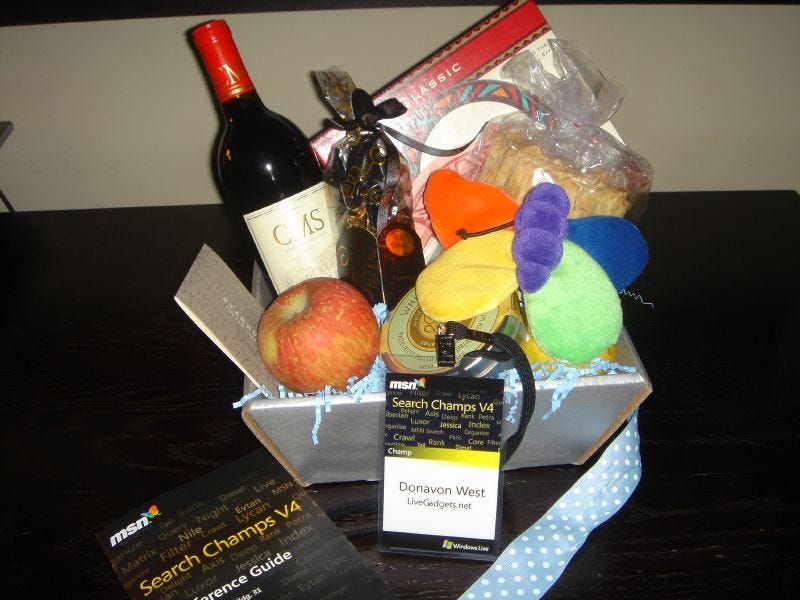
At this point, I was embarrassed and thought maybe I should just go to bed to try and sleep off the jetlag. Then I saw a message to the list from Emily Chang, who was part of the Web 2.0 Workgroup. She and her boyfriend Max Kiesler ran a web design consultancy called Ideacodes, and both would be attending Search Champs. “Richard — don't worry. Max and I sent you a gift basket from Ideacodes :) - champagne and cheese board arriving via room service shortly!” As soon as I read that, Reception called to say that Emily and Max’s gift basket was on its way. An email from Kevin Briody, a marketing manager at Microsoft, followed a few minutes later:
“I couldn't let a first time visitor to Seattle arrive without a proper welcome. So in addition to Emily and Max's champagne and cheese, you should expect a few of our fine local microbrews (we have some of the best) to arrive shortly, courtesy of the team at MSN.”
I was now fully mortified and attempted to save face by replying once again to the list. “Looks like the party's in my room tonight,” I wrote, adding that it was a “pity I'll be falling asleep very soon.” Several gift baskets duly arrived in my room, while the email thread continued. After an hour or so, when I was sure that no more hotel porters would be knocking on my door, I prepared myself for bed. I don’t even remember now if I opened the champagne or any of the brews. But I’m certain I fell asleep as soon as my head hit the pillow.
The next day, while I was out exploring Seattle, an email arrived from Mike Arrington. He’d flown up from San Francisco and had evidently just arrived at the hotel. The email was addressed to Fred and me. “No fucking gift basket either,” it read.
On Tuesday, a bunch of us — including Fred and Josh — went to explore the famed Seattle Central Library, designed by Rem Koolhaas and Joshua Prince-Ramus. It had only opened in 2004 and we all had our digital cameras out, taking photos of the lime green escalator, bright red corridors, and the massive glass windows cross-crossed with steel netting. One of my Seattle-based blog buddies, Erik Benson, had recommended I check out the “electronic bulletin board on the 5th floor that displays, in semi-real time, all the books that are being checked in and out, as well as searches, etc.” That board was indeed a marvelous blend of two things that I loved: libraries and digital technology.
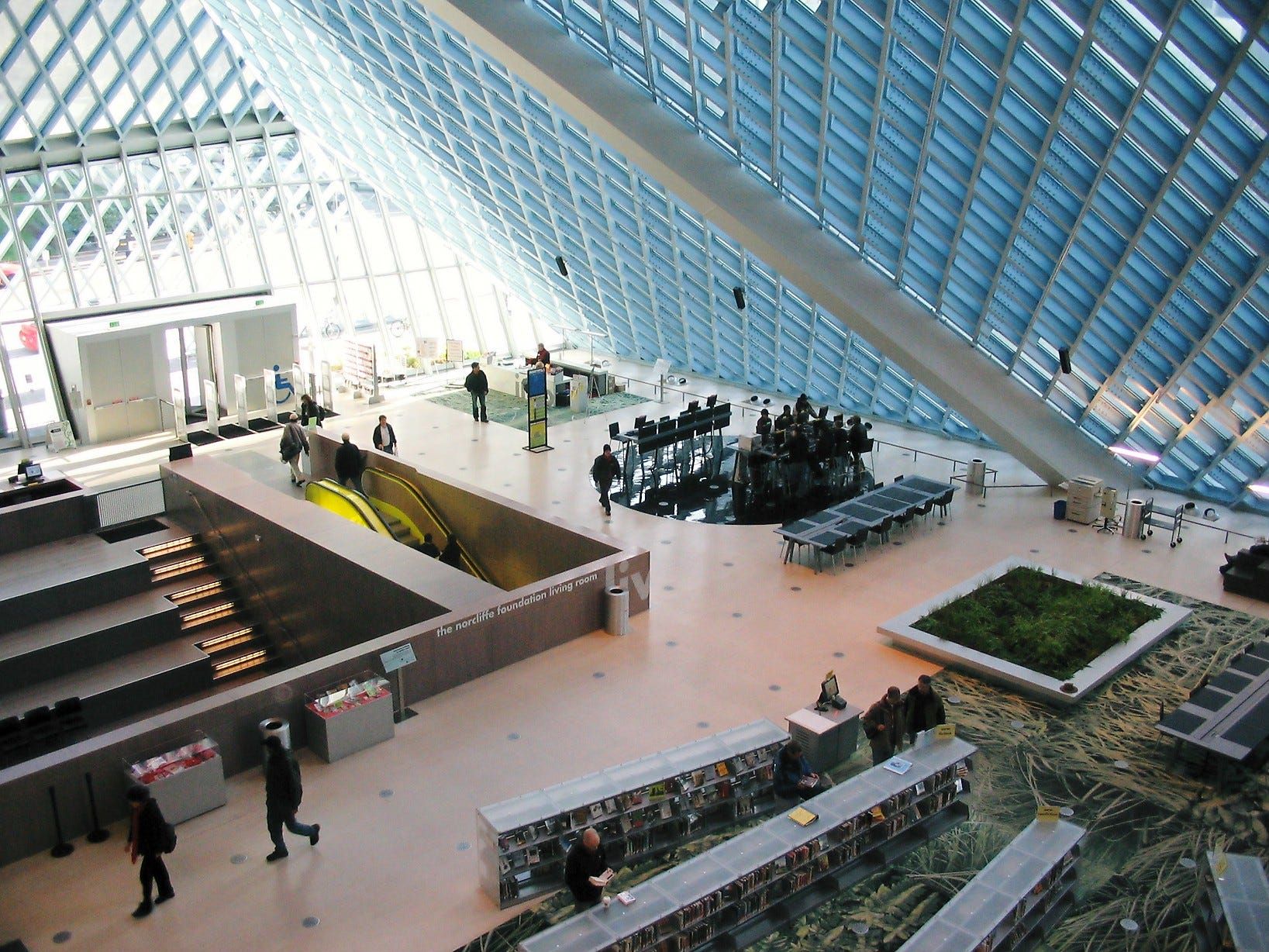
I’d arranged to meet Erik and his startup, The Robot Co-op, in the afternoon. Over the past few years, we’d swapped emails now and then and commented on each other’s blogs, but I hadn’t yet met him in person.
When I first began communicating with Erik, around 2003, he was working as a developer and product manager for Amazon. Now, he was building his own social software tools, with names like 43things.com and allconsuming.net. These were websites that allowed you to track your daily activities online. It was an early form of social media, but focused on what you did rather than what you thought. If you had checked the homepage on the week I visited The Robot Co-op office, you’d have read that “210,751 people in 4,813 cities are doing 326,312 things including…see the aurora borealis, play strip poker, drink more alcohol, have better handwriting, own my own bar, read the Chronicles of Narnia,” etcetera.
43Things was well-intentioned, in that it tried to help you set goals for your life. It was also a cool app for young, urban types who were geeky enough to use the internet on a daily basis (still not true for most people in the world at that time). I tested out 43Things in 2005, as I did with many other Web 2.0 products. I only added seven “things” to my profile, one of which was “Visit Silicon Valley” — and I’d duly checked that off as “done.” Erik’s 43Things profile included day-to-day things that, frankly, I wished I could do too (“hang out at The Hideout every Wednesday“). I remember thinking that 43Things was documenting a lifestyle that I aspired to but could only access online. Of course, this is exactly what social media turned into when it went mainstream five to ten years later.
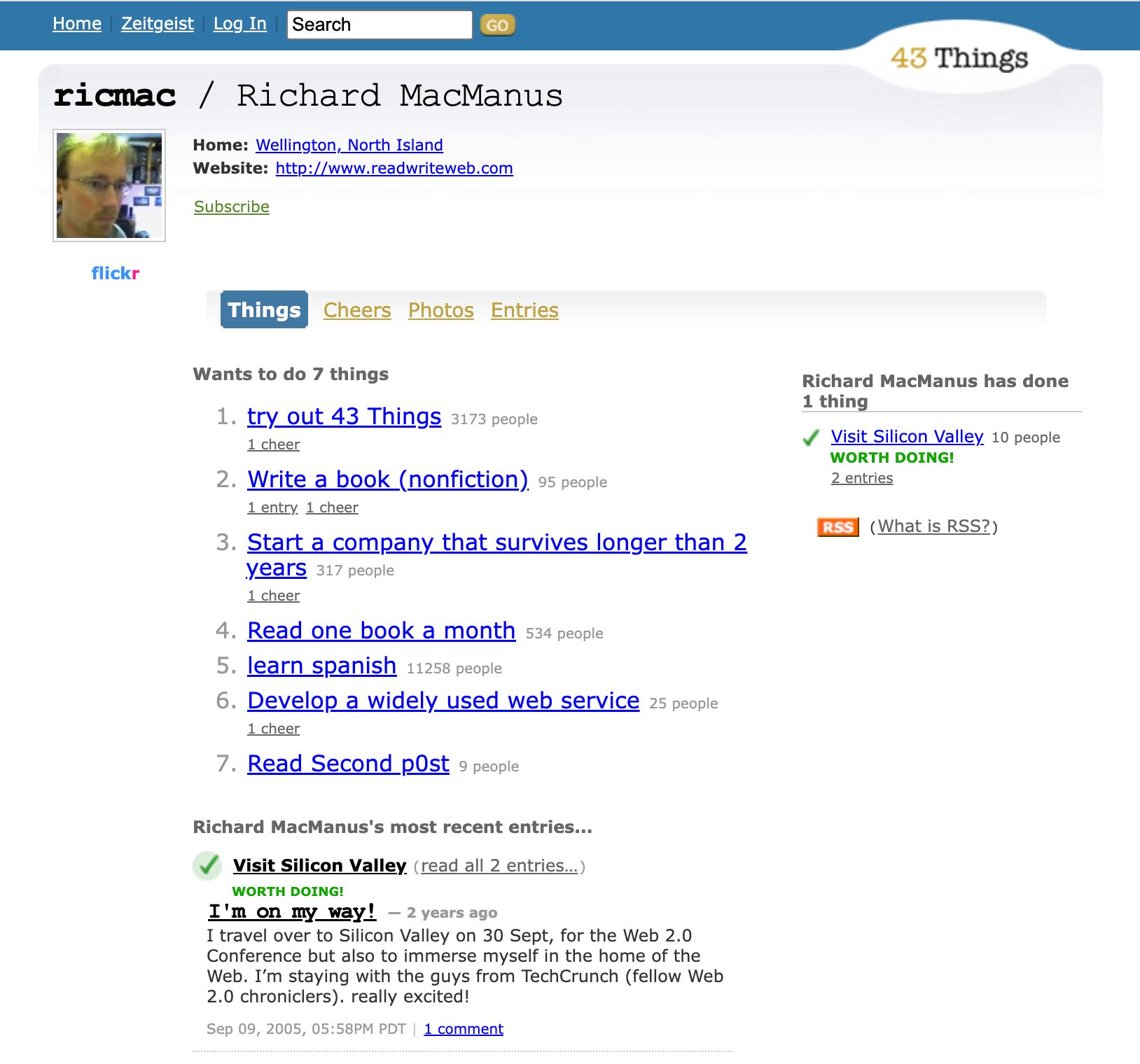
Fred wanted to meet The Robot Co-op team too, so after lunch we both walked up the hill to the office address at 1205 East Pike St. It was a pleasant winter day and unseasonably sunny, or so I’d been told over email by the locals attending Search Champs. We walked past cafes — Starbucks, naturally, but there were other more quirky ones too — and the odd hipster bar (including The Hideout, Erik’s weekly place to be). We also walked past rows of nondescript but busy-looking office buildings, most of them no more than a few stories high. All of this gave me similar vibes to walking around my hometown of Wellington, New Zealand — where the coffee was just as good and the weather just as bad! I could easily see myself living and working in Seattle.
When we arrived, Erik came downstairs to greet us. In person, he was tall and lean, with a baby face and spiky black hair. He was about five years younger than me and looked as cool as I looked staid. I was wearing my usual blue-striped polo shirt, dark blue jeans and a cheap-looking brown winter jacket. I was still overweight, with my fine, straight hair combed unfashionably to the sides. If you were to imagine a newly married nerd with an unexciting social life, I was the picture of that. By contrast, Erik looked cool and youthful in his skinny black jeans, black tee-shirt and casual black blazer.
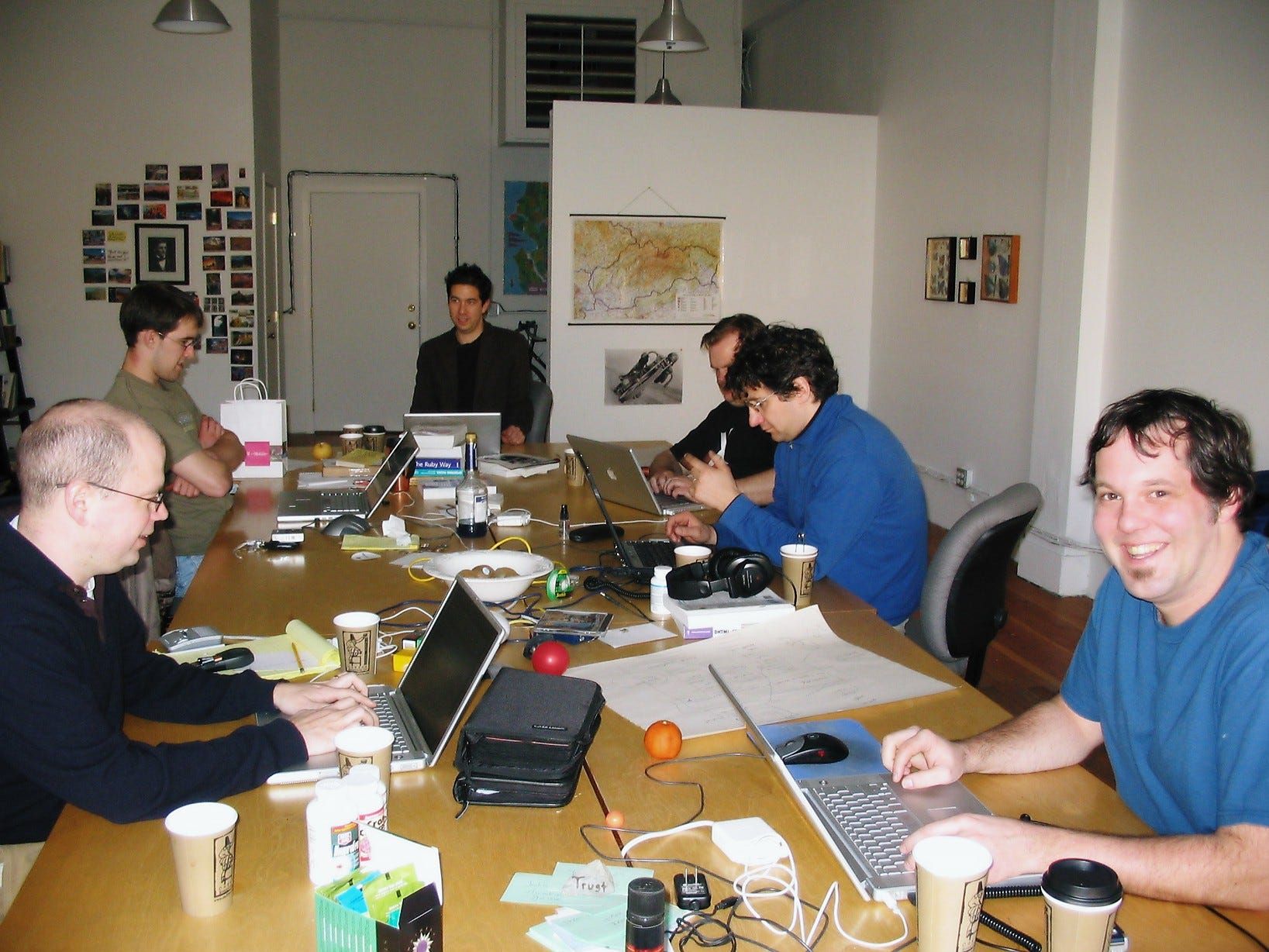
Upstairs in The Robot Co-op office, we met the other members of the team, including Erik’s co-founders Daniel Spils and Josh Petersen. Daniel quizzed me about my stance on Web 2.0, which was an ongoing debate in the startup community — many developers and designers rejected the label, although just as many cashed in on it too. I told him I was conflicted about the hype around the term, but I also believed there were significant changes happening in web development and design. I mentioned the book that Josh Porter and I were writing for O’Reilly Media, and that we were focusing on best practices for designing networked applications.
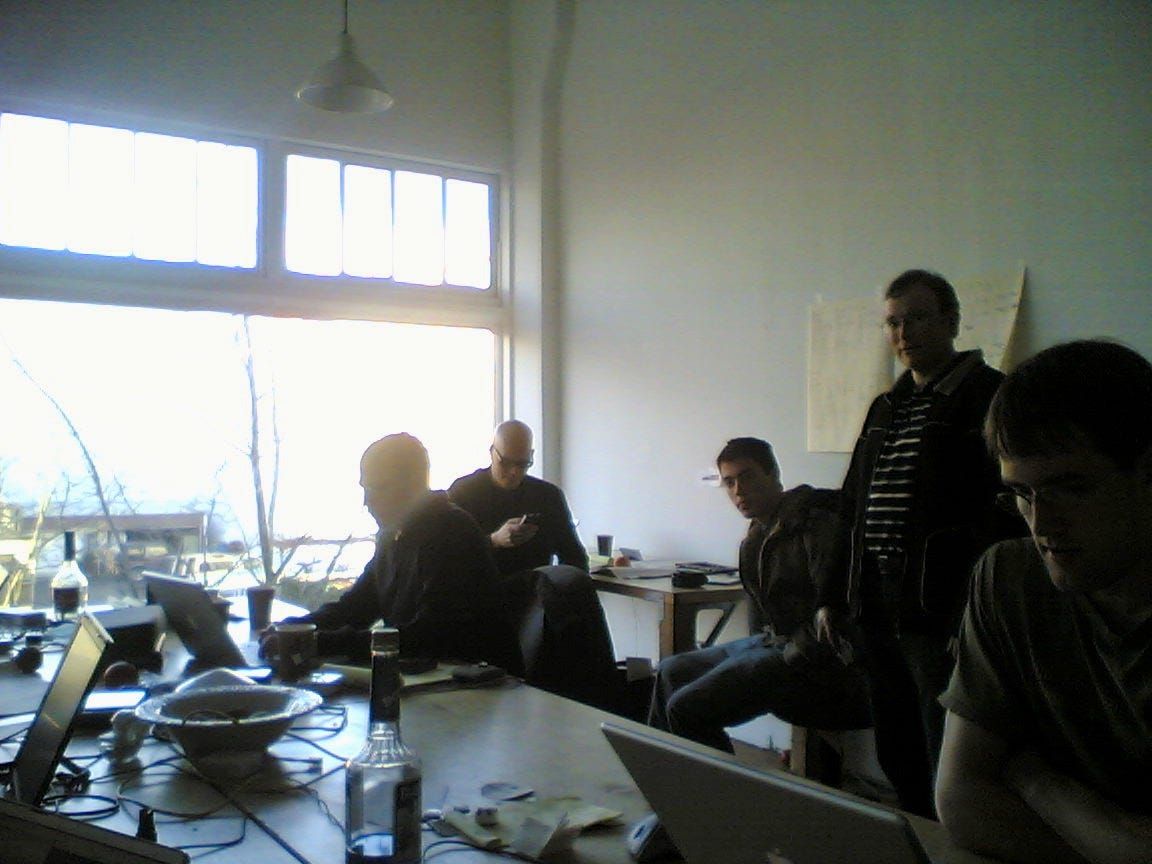
Before we left, I promised to try and make it to the Andy Warhol-themed party Erik was holding the following evening at The Hideout. In the meantime, Fred and I needed to get back to the hotel to prepare for the Search Champs welcome party, being held at the nearby Chapel Bar.
This post is part of my serialized book, Bubble Blog: From Outsider to Insider in Silicon Valley's Web 2.0 Revolution. View table of contents.
Next up: 013. Visiting the Microsoft Campus
Buy the Book
My Web 2.0 memoir, Bubble Blog: From Outsider to Insider in Silicon Valley's Web 2.0 Revolution, is now available to purchase:
- Paperback, US$19.99: Amazon; Bookshop.org
- eBook, US$9.99: Amazon Kindle Store; Apple Books; Google Play
Or search for "Bubble Blog MacManus" on your local online bookstore.